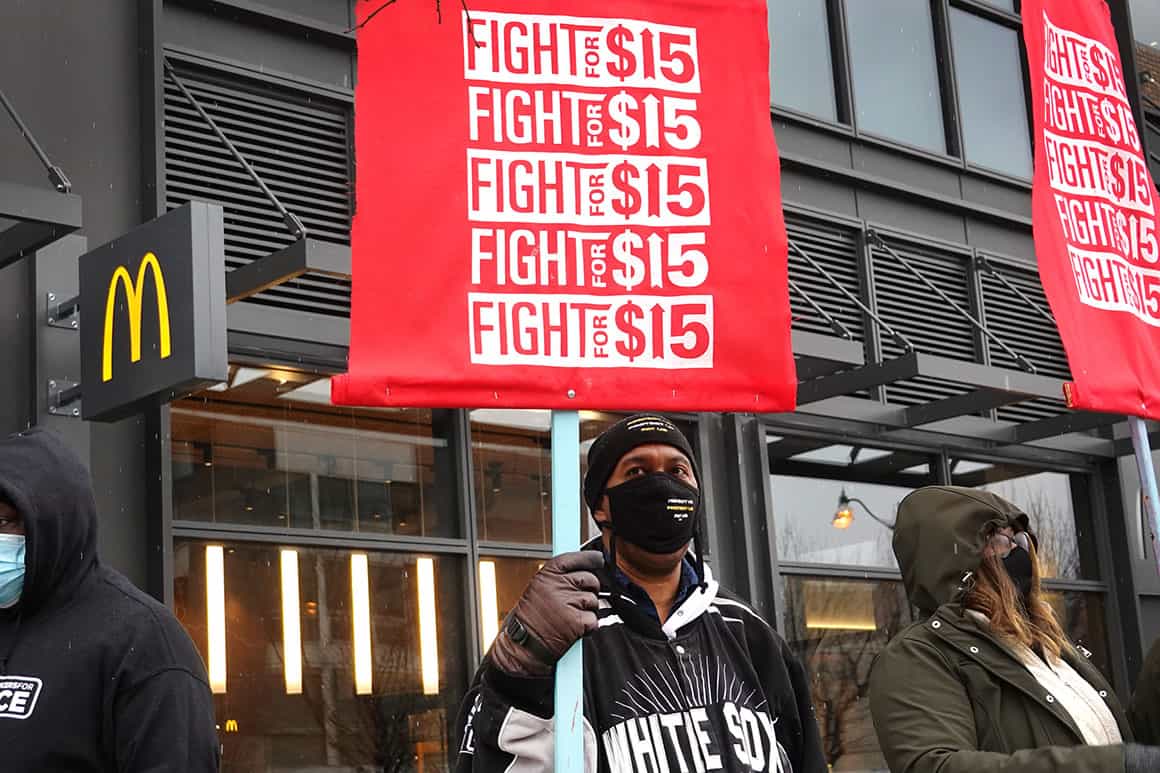William Greenlaw is a student at Harvard Law School.
Members of the United Auto Workers yesterday rejected a second offered deal by Deere & Co. This has the effect of extending the already three-week-long strike. Among the items rejected in the deal were larger wage increases, a signing bonus of $8,500, a “$35,000 retirement bonus for workers with 10 to 24 years on the job and a $50,000 bonus for workers with at least 25 years,” albeit with no new tiers of retirement benefits. The wage increase at 14 Deere facilities was larger than almost a dozen other bargaining agreements signed to by the UAW since 2018. That the union rejected such a deal is a testament to growing worker power in the waning days of the coronavirus crisis which has led to stiffer labor markets. University of Chicago historian Gabriel Winant noted, “Thirty five years ago, workers at Deere lost a lockout and took a deal that froze and reduced wages. Today they rejected an offer that starts with a 10% raise. It’s the biggest downward shift in the economic balance of power in my lifetime.”
Workers in Tucson, Arizona, obtained a victory with voters yesterday when they approved a $15 minimum wage. Known at Proposition 206, the citizen initiative passed overwhelmingly by a 2-to-1 margin. The measure implements the minimum wage over time, starting with $13 in April 2022 and reaching the $15 minimum by 2025. Supporters of the wage argued that wage increases were needed in a city where the cost of living has risen. Opposing parties, helmed by business leaders, countered that the minimum wage would hurt employers as the nation comes out of the pandemic. Part of the measure’s success, however, came from the support over 100 small businesses bucking the industry and lending their endorsements. Raising the minimum wage in the past has faced unorthodox opposition from the Republican-led state legislature in the past. Legislators are attempting to fine the City of Flagstaff, the only other remaining city that raised the minimum wage to $15, by arguing that the increased wage rate raises costs on Arizona agencies. It is dubious whether such a fine is legal. A state court judge has already halted the attempted $1.1 million fine on the City of Flagstaff.
Worker influence continues in the House of Representatives where the House Judiciary Committee advanced the Forced Arbitration Injustice Repeal Act, also known as the FAIR Act. In stark contrast to the difficult-to-surmount application of the Federal Arbitration Act, this bill “would allow people to pursue employment, consumer, antitrust, or civil rights claims in court when they are physically or financially harmed by a corporation, even if they had signed a mandatory arbitration agreement.” Supporting the bill, Committee Chairman Jerrold Nadler called forced arbitration a “living nightmare” for workers. Chairman Nadler commented further, saying, “[P]owerful corporations use forced arbitration as a tool to insulate themselves from accountability for abusing workers, consumers, and small businesses. By burying a forced arbitration clause deep in the fine print of take-it-or-leave-it contracts, companies can evade the justice system, where plaintiffs have far stronger legal protections, and hide behind a one-sided process that is rigged in their favor.” Were the bill passed into law, it would put in place at the federal level limits on forced arbitration that already exist in a handful of states, including New York.






Daily News & Commentary
Start your day with our roundup of the latest labor developments. See all
July 11
Regional director orders election without Board quorum; 9th Circuit pauses injunction on Executive Order; Driverless car legislation in Massachusetts
July 10
Wisconsin Supreme Court holds UW Health nurses are not covered by Wisconsin’s Labor Peace Act; a district judge denies the request to stay an injunction pending appeal; the NFLPA appeals an arbitration decision.
July 9
the Supreme Court allows Trump to proceed with mass firings; Secretary of Agriculture suggests Medicaid recipients replace deported migrant farmworkers; DHS ends TPS for Nicaragua and Honduras
July 8
In today’s news and commentary, Apple wins at the Fifth Circuit against the NLRB, Florida enacts a noncompete-friendly law, and complications with the No Tax on Tips in the Big Beautiful Bill. Apple won an appeal overturning a National Labor Relations Board (NLRB) decision that the company violated labor law by coercively questioning an employee […]
July 7
LA economy deals with fallout from ICE raids; a new appeal challenges the NCAA antitrust settlement; and the EPA places dissenting employees on leave.
July 6
Municipal workers in Philadelphia continue to strike; Zohran Mamdani collects union endorsements; UFCW grocery workers in California and Colorado reach tentative agreements.